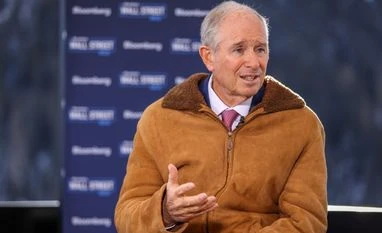Numbers justify Fitch downgrade, says Blackstone CEO Steve Schwarzman
"The numbers justify it, regrettably," the Blackstone Inc. chief executive officer said on CNBC Friday
)
Steve Schwarzman (Photo: Bloomberg)
Listen to This Article
By Dawn Lim and Erin Fuchs
Steve Schwarzman said Fitch Ratings’ downgrade of the US long-term credit rating was appropriate after multiple debt-limit standoffs.
“The numbers justify it, regrettably,” the Blackstone Inc. chief executive officer said on CNBC Friday. “We’ve had an explosion of debt since the global financial crisis. We don’t appear to have a lot of discipline.”
Fitch’s decision this week to lower the US long-term rating to AA+ from AAA, based on the US government’s debt burden and “erosion of governance,” rattled the stock market and prompted criticism from both inside and outside the Biden administration.
JPMorgan Chase & Co. CEO Jamie Dimon told CNBC that the downgrade “doesn’t really matter that much,” and that US credit is sound and should be the highest-rated in the world. Treasury Secretary Janet Yellen called the downgrade “entirely unwarranted.”
Also Read
Schwarzman, 76, said regardless of the rating, for now the US is the world’s reserve currency. “When there’s a crisis in the world, they buy our securities,” he said. But that doesn’t last forever if there isn’t discipline, he warned.
In the wide-ranging interview, the executive said he’s optimistic that the Federal Reserve’s fight against inflation is working, and the US may be able to skirt a recession if price pressures continue to ease.
Schwarzman also weighed in on the emergence of artificial intelligence, calling it “one of the most exciting developments of a lifetime” and a competitive advantage for businesses. “If we get there first with our companies, then they’ll be much better positioned than somebody who shows up five years later.”
He predicted that a global institution akin to World Trade Organization will emerge to audit the safety of AI technologies.
The billionaire Republican donor continued to keep mum about which candidate he’s backing in the US presidential race, but said “it’s time for a new generation of people to take that slot.” The job of president is demanding, which raises questions about whether someone approaching their 80s would be best-suited, he said.
More From This Section
Topics : Blackstone Fitch Ratings Companies
Don't miss the most important news and views of the day. Get them on our Telegram channel
First Published: Aug 04 2023 | 10:40 PM IST
